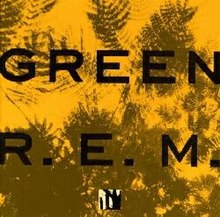Green (R.E.M. album)
| Green | ||||
|---|---|---|---|---|

Cover to the standard release of Green
|
||||
| Studio album by R.E.M. | ||||
| Released | November 7, 1988 | |||
| Recorded | May–June and July–September 1988 | |||
| Studio | Ardent Studios, Memphis (first sessions) and Bearsville Studios, (latter sessions) | |||
| Genre | Alternative rock | |||
| Length | 41:01 | |||
| Label | Warner Bros. | |||
| Producer | Scott Litt and R.E.M. | |||
| R.E.M. chronology | ||||
|
||||
| Singles from Green | ||||
|
||||
| Green promo cover | ||||

Promotional copies of Green came in a cloth case with a debossed cover. The dark colors and texture were meant to go with the album's message of environmentalism.
|
||||
| Professional ratings | |
|---|---|
| Review scores | |
| Source | Rating |
| AllMusic | |
| Chicago Tribune | |
| Entertainment Weekly | B+ |
| Los Angeles Times | |
| NME | 9/10 |
| Pitchfork Media | 8.4/10 |
| Q | |
| Rolling Stone | |
| The Rolling Stone Album Guide | |
| The Village Voice | B+ |
Green is the sixth studio album by American alternative rock band R.E.M. and their first release for Warner Bros. Records. Co-produced between the band and Scott Litt, and released in November 1988, the album continued to explore political issues both in its lyrics and packaging. R.E.M. experimented on the album, writing major key rock songs and incorporating new instruments into their sound, including the mandolin, as well as switching their original instruments on other songs.
Upon its release, Green was a critical and commercial success. To promote Green, the band embarked on an 11-month world tour and released four singles: "Orange Crush", "Stand", "Pop Song 89", and "Get Up". For its 25th anniversary in 2013, a special edition was released.
With the release of Document in 1987, R.E.M. fulfilled its contract with I.R.S. Records. Frustrated that its records did not see satisfactory overseas distribution, in early 1988 the band told I.R.S. head Jay Boberg that it was leaving the label. Guitarist Peter Buck also explained that his group felt it was being pressured to sell well by I.R.S., yet felt I.R.S.'s distributor MCA Records did not consider the ensemble a priority. R.E.M.'s management then approached any record companies that expressed interest in the band. Though other labels offered more money, R.E.M. ultimately signed a deal with Warner Bros. Records—reportedly between $6 million and $12 million—due to the company's assurance of total creative freedom. In light of its move to a major label, the band became defensive in interviews about accusations from some fans who claimed it was selling out.
R.E.M. began the album process by recording demos at Robbie Collins' Underground Sound Recording Studio in Athens, Georgia in February 1988. Bill Berry, Peter Buck and Mike Mills recorded the basic tracks in two configurations: (1) drums, guitar, and bass, and (2) percussion, mandolin, and accordion. The demos were mixed by Robbie Collins, Buren Fowler (guitar tech for Peter Buck and later member of Drivin N Cryin), and David LaBruyere (later bassist for Vic Varney, Michelle Malone, and John Mayer) and presented to R.E.M. management. Michael Stipe used these recordings for his vocal arrangements. Some of these demos, including "Title," "Great Big," "Larry Graham" and "The Last R.E.M. Song," have never been commercially released. The demo "Larry Graham" was named for Sly and the Family Stone bassist Larry Graham, who was famous for his slap-bass style. "Larry Graham" has many similarities musically with Out Of Time opener "Radio Song." "Title" was an older song which had been demoed for Document the prior year and performed often on the Work Tour. "Title" is the only unreleased song from these demo sessions known to have recorded vocals.
...
Wikipedia
